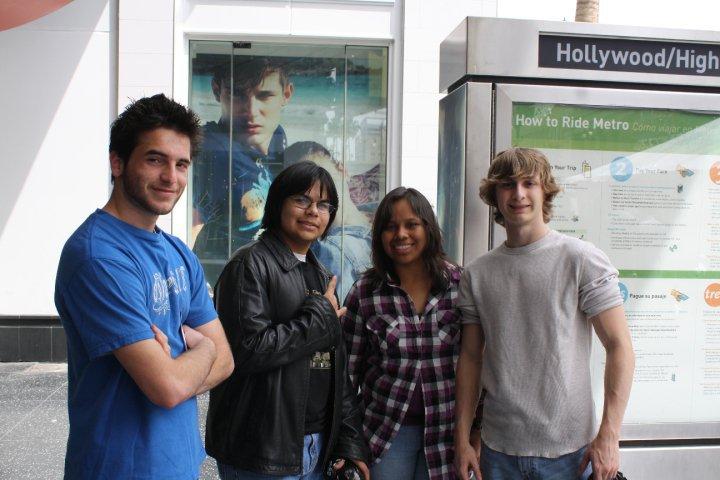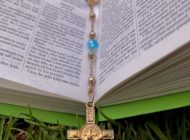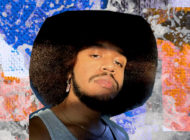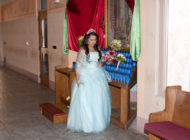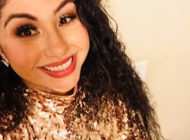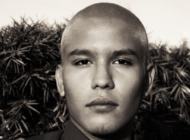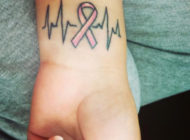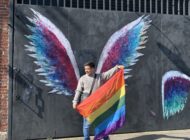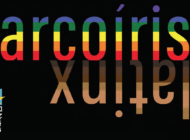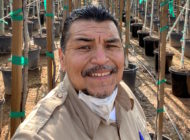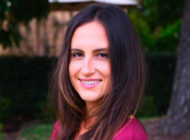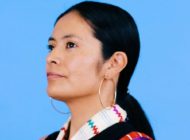Erika Palafox grew up in a very religious Seventh Day Adventist household and was very involved in her church until the day she decided to come out as a lesbian to her mom and friends.
By CLO HIDALGO
EL NUEVO SOL
Erika Palafox was born on October 1992 in Los Angeles, California to immigrant parents from Puebla, Mexico. She is the oldest of four siblings (two brothers and one sister). She says her parents met in elementary school and have always been really close. Faith has helped her parents keep their relationship all these years.
Palafox was raised as a Seventh-day Adventist. Some of the things they believe in is that Saturday is a day to rest and in the second coming of Jesus.
“We believe that God came to earth, died, went back to heaven and He will return for a second time. Our religion does not believe that homosexuality is normal. It is a sin”, says Palafox about the beliefs Seventh Day Adventists have.
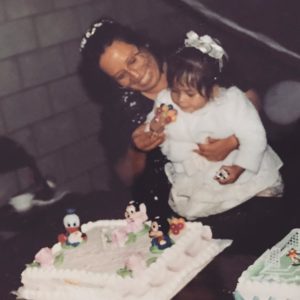
Erika Palafox with her mom. Photo courtesy of Erika Palafox
Ever since she was a little girl, she had been very religious. Her dad was her first teacher who taught her about the Bible. Any question she had about God or the Bible, she knew she could count on him. Palafox has read the Bible three times in English and three times in Spanish. She enjoyed participating in religious matters such as being spiritual vice president in middle school and being a pastor for her class and school during high school.
“I was always involved in religion and I never got carried away by what I felt because for me it did not make sense to do that,” Palafox describes about the confusion she felt because she did not understand her sexual orientation. “I felt guilty. But I did not fully come to understand it until I was in college and started talking to my psychology professors who were the same religion as me. They told me it cannot be cured.”
According to the organization Parents, Families, and Friends of Lesbians and Gays, homosexuality cannot be cured because it is not a disease. It is a way of being just like being heterosexual.
When her professors told her what she was feeling was normal was when she started to accept that she was a lesbian. She says she felt relief because she knew what she was feeling was considered normal and not like her religion had made her believe. Before she spoke to her professors about her sexual orientation, Erika Palafox felt angry at God because she did not understand why He decided that she be homosexual.
“Part of me”, she remembers when she still questioned her sexual orientation, “would tell God ‘I have done everything wring from the start to finish, how did you allow for me to feel these things? Why did you permit it?’”.
Once she accepted reality, Palafox still had to tell her secret to her friends and family, but more importantly, she wanted to decide if she wanted to be part of her religion where they did not accept her.
“The most difficult part was separating religion and the person I am and the person that I believe is God,” she says. “I left the religion aspect and the people who are part of that religion and I focused more on the God I knew, the God that I fell in love with. The God I knew in the Bible loves you, knows everything about you. I told Him he had to see my heart.”
The first couple of people that Palafox told that she was a lesbian were her friends because she did not feel prepared to tell her parents. With her friends, she knew she did not have to fear anything.
“We were at a party and she told me she was a lesbian,” her friend Rita Workman remembers. I told her okay. Ever since that night, our friendship has not changed. It’s the same.”
The relationship between her mom and her has always been very open and they had been able to talk
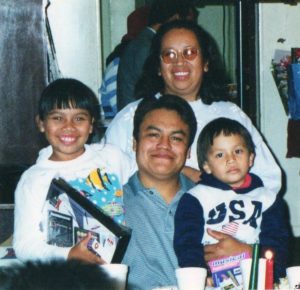
Erika Palafox with her family. Photo courtesy of Erika Palafox.
about anything with the exception of her sexual orientation because of their religion. There was numerous times Erika Palafox wanted to tell her mom that she was a lesbian, but she didn’t feel confident. One day during breakfast, she told her mom that she had to tell her something important. Before telling her, she started to cry. Her mom got worried and asked what was wrong. Erika Palafox finally had gotten the necessary strength to tell her mom she was a lesbian.
“She started to cry,” Erika says, “and she was a little defensive, but asked me if I was sure, how did I know. She had a lot of questions and it made sense. I answered her questions one by one. She told me she never thought one of her kids would be gay and that this news was very difficult for her to understand, but nothing would change between us. She loved me, but to give her time to process it all because she was raised in another world.”
Erika Palafox gave her mom permission to tell whomever she wanted about her sexual orientation, but her mom did not want anyone to know her daughter’s secret. According to Rosa Manriquez, LGBTQ activist and mother of two lesbian daughters, a lot of times parents do not want other people to know their child’s sexual orientation because they do not want others to hate them.
“Nobody knows my child like I do,” says Manriquez referring to parents whose kids are LGBTQ. “Parents want what we think is best for our children. We don’t want them to be judged.”
Manriquez explains one of the reasons why religion, such as the Seventh-day Adventist Church, is very strict is because their beliefs have been institutionalized for years. It is not very easy to change the beliefs of these types of religions.
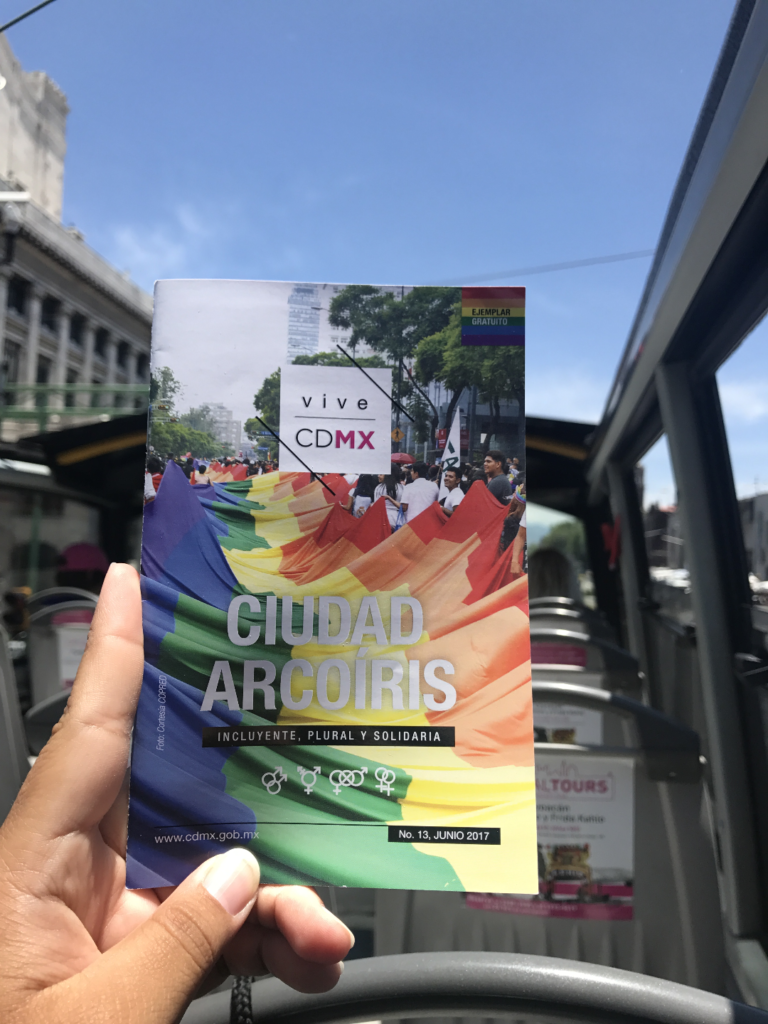
The Rainbow City in Mexico City. Photo courtesy of Erika Palafox.
Sometimes, a group of people do not like certain beliefs from their religion and they separate to make a branch of their religion that will be different. For example, the Disciples of Christ have protestant beliefs just like the Seventh-day Adventist Church, but the difference is that the Disciples of Christ do welcome the LGBTQ community.
Now in day, Erika Palafox does not feel as religious after she accepted her sexual orientation. Her belief in God has changed a bit with the beliefs she had been raised in.
“Part of me wants to believe that there is someone watching every step and that loves you with a love so great you can’t even imagine it,” she says. “With time, I think I will be able to separate all the emotional that is religion, I don’t see much sense in that form.”
Palafox has just started a relationship with her first girlfriend and soon will be presenting her to her mom because she asked to meet her. For Palafox, this is huge because slowly her mom will start to understand the LGBTQ community.
“My mom is taking it like they say, ‘baby steps’ and I feel so proud of her because this is a huge step in our lives.”
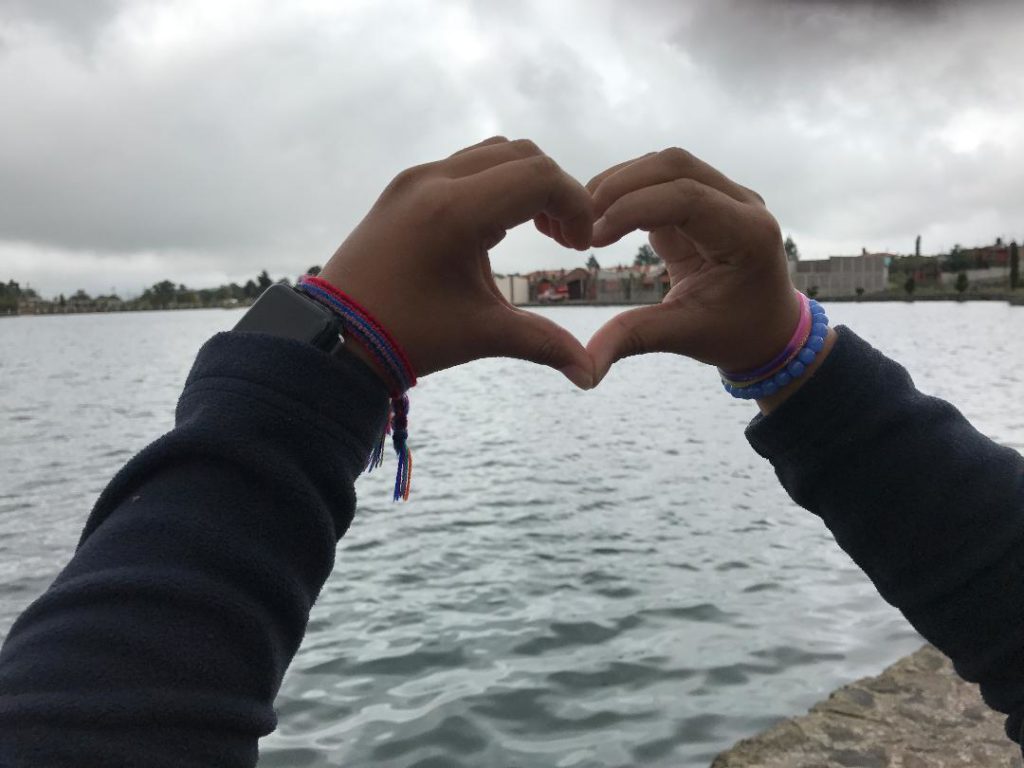
Hands in shape of a heart. Photo courtesy of Erika Palafox.
Tags: Latina LGBTQ religión Seventh-day Adventist







